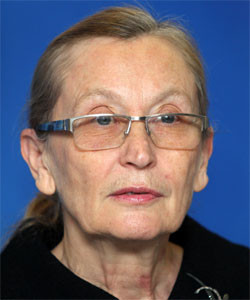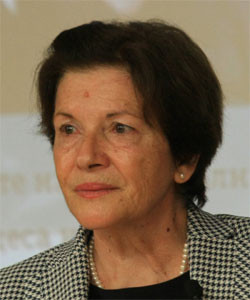Bulgaria's road to EU membership is an interesting chapter of this country's latest history. In 2018 the Diplomatic Institute at the Ministry of Foreign Affairs and the Jean Monnet Center of Excellence at the Department of European Studies at Sofia University "St. Kliment Ohridski" created a national archive of memories of the accession of Bulgaria to the EU. This is a collection of interviews with 40 people who have contributed to the European integration of Bulgaria. In the interviews they share their brightest memories of the country's road to EU membership in 2007. "Bulgaria has been a member of the EU for more than 12 years now and more and more people take EU membership for granted and do not know much about the accession process, creators of the project said.
In their work they have been guided by the belief that joining the EU was a key event that would determine the path of this country for decades.
 As part of this project, the Diplomatic Institute organized a discussion "Conversation about the European Union - Past, Present and Future." It took place as a dialogue between students from the Sofia University and participants in Bulgaria's EU accession talks in the 1990s - diplomats, experts and scientists. Today none of them is working in the state administration but they continue to be active and contribute to the European path of this country. "Many people like us, have invested their work, efforts, and enthusiasm in this process. Our membership had not come for free and we have had many sleepless nights, so that all of us, and especially our students, can now travel and study abroad under the Erasmus program of the EU rather than wait for a visa in front of Embassies’s door," Professor Ingrid Shikova from the Department of European Studies of the Sofia University told young people:
As part of this project, the Diplomatic Institute organized a discussion "Conversation about the European Union - Past, Present and Future." It took place as a dialogue between students from the Sofia University and participants in Bulgaria's EU accession talks in the 1990s - diplomats, experts and scientists. Today none of them is working in the state administration but they continue to be active and contribute to the European path of this country. "Many people like us, have invested their work, efforts, and enthusiasm in this process. Our membership had not come for free and we have had many sleepless nights, so that all of us, and especially our students, can now travel and study abroad under the Erasmus program of the EU rather than wait for a visa in front of Embassies’s door," Professor Ingrid Shikova from the Department of European Studies of the Sofia University told young people:
"We had been attracted by the idea of making a compilation of interviews to be made available to anyone who wished to use them for future research. It cost tremendous efforts, but is a proof that when people have a cause they can achieve something. Perhaps that is why Bulgaria became EU Member State. There was a common goal and we all worked to achieve it. I hope that we would now unite and work together for Eurozone membership.”
The "Live Archives" discussion was also attended by Ambassador Bisserka Benisheva, who had an active role in the pre-accession process of the 1990s, occupying different various positions in the administration:
 "I was part of the Bulgarian delegation in 1992 when we were negotiating association with the European Community. I remember preparations for applying, the decision to open negotiations, as well as their completion. I think I was most excited in December 1992 when we signed the European Association Agreement - the first step for Bulgaria on the path to membership. This happened just after the fall of the Berlin Wall and we were all very enthusiastic about the future. We also worked with a sense of responsibility towards our own children. We knew we need to do something in order for them to live better lives than us. I remember, the head of the EC delegation back then who raised a glass of champagne with our delegation and told us - "you deserve your glass of champagne." It was very exciting to be part of all this. Then came the disappointment of 1997 when it was decided to open negotiations with six candidate countries, while for other 6, including Bulgaria, the decision was postponed for the long-term. This meant waiting for five years. Before that we were absolutely dedicated to answering questionnaires, giving information, working night and day and did not deserve this delay. But we got the call for talks much faster - in 1999. But what happened in the period 1997 - 1999 gave a boost to things? It was not that the countries in our group made a huge leap, but the crisis in Kosovo took place. In 1999, the Peace Plan proposed by the International Community for Ending the Kosovo Conflict was adopted. People realized that accelerating the process of unification in Europe after the end of the Cold War would bring about the security and stability that everyone was expecting."
"I was part of the Bulgarian delegation in 1992 when we were negotiating association with the European Community. I remember preparations for applying, the decision to open negotiations, as well as their completion. I think I was most excited in December 1992 when we signed the European Association Agreement - the first step for Bulgaria on the path to membership. This happened just after the fall of the Berlin Wall and we were all very enthusiastic about the future. We also worked with a sense of responsibility towards our own children. We knew we need to do something in order for them to live better lives than us. I remember, the head of the EC delegation back then who raised a glass of champagne with our delegation and told us - "you deserve your glass of champagne." It was very exciting to be part of all this. Then came the disappointment of 1997 when it was decided to open negotiations with six candidate countries, while for other 6, including Bulgaria, the decision was postponed for the long-term. This meant waiting for five years. Before that we were absolutely dedicated to answering questionnaires, giving information, working night and day and did not deserve this delay. But we got the call for talks much faster - in 1999. But what happened in the period 1997 - 1999 gave a boost to things? It was not that the countries in our group made a huge leap, but the crisis in Kosovo took place. In 1999, the Peace Plan proposed by the International Community for Ending the Kosovo Conflict was adopted. People realized that accelerating the process of unification in Europe after the end of the Cold War would bring about the security and stability that everyone was expecting."
English: Alexander Markov
Photos: BGNESThe Bulgarian dance group “Dilmana” based in Copenhagen will celebrate 15 years since its establishment with a celebration on October 18, the formation informed on its Facebook page. Dance group Dilmanа from Copenhagen to perform at the folklore..
A photo exhibition called “Bosilegrad Before and Now – 2” will open on October 13 at the Municipal Art Gallery in the town of Karlovo. The photo exhibition contains 40 panels with motifs and landscapes from Bosilegrad, Serbia, and several Bosilegrad..
The second edition of the unique Blackthorn Festival will be held today in the village of Salash near Belogradchik, northeastern Bulgaria. The event will begin on the square, where locals will offer sweets and jam from tart blackthorns collected in..

+359 2 9336 661
